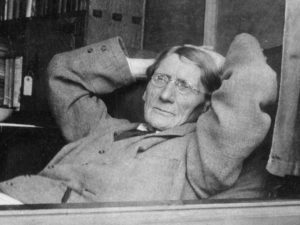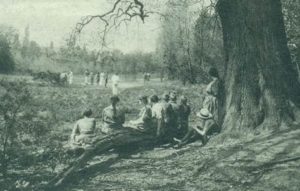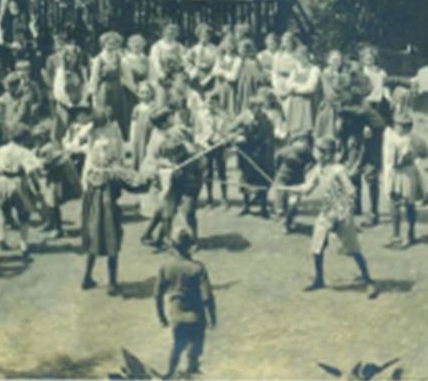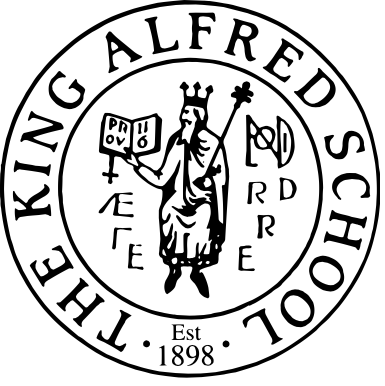All As Broad As It’s Long
Mr. John Russell was the Headmaster of King Alfred School in 1902. It was a new and independent school, established in 1898. And it was progressive:

The King Alfred School was founded in 1898 by a group of parents who believed in the then radical idea that boys and girls should be educated together in a secular environment that encouraged learning for its own sake. (King Alfred School, n.d.)
John Russell cared about his students; he described the purpose of his school as follows:
Our objective is to help train up its scholars in the way of the good life, to help to fit them for effective work in the world, for effective sympathy and for effective joy. (Russell, n.d.)
Russell took what might be called a “subjective view” of the child. He was active in the so-called Child Study movement, and was a featured speaker at the 1910 annual conference of the Child Study Society (The British Medical Journal, 1910, p. 1347).
But that was not the only conference that featured Russell as a speaker. In 1902, he spoke at the 1902 PNEU Annual Conference in London, England. His topic was “Our Relations With Literature.” Of course, the PNEU believed that “education is the science of relations.” Russell’s credentials and point of view seemed to augur a successful session. Henrietta Franklin was in attendance.
As he gazed upon the audience of PNEU educators, he started strong:
We are influenced — for good or for evil — (educated or diseducated) by all our acquaintances, animate and inanimate. Among these our parents and educators — especially our parents — must distinguish between the influences that are likely to shape our lives and the influences that are likely to misshape them, and while helping us to ripen the former into intimacies, must also help us betimes to avoid or break with the latter. (Russell, 1902, p. 641)
Education is the science of relations! What relations does literature establish? Russell continued:
Of all sources of intimacies (intimacies of both kinds, the helpful and the harmful) literature — though it nowhere brings us into direct contact with real things — is in one sense the richest source, because in so far as it is a complete picture of life, it includes within itself all other possible sources. (Russell, 1902, p. 641)
Here then is another thing that literature does for us. In addition to reflecting and interpreting life, it enlarges our circle of personal acquaintances, and permanently surrounds us — if we will — with such a band of lovable, wise, brave, and inspiring men and women as life itself could never bring into one household or one environment. (Russell, 1902, p. 644)
Russel’s statement closely parallels a similar statement by Mason:
Perhaps the main part of a child’s education should be concerned with the great human relationships, relationships of love and service, of authority and obedience, of reverence and pity and neighbourly kindness; relationships to kin and friend and neighbour, to ‘cause’ and country and kind, to the past and the present. History, literature, archeology, art, languages, whether ancient or modern, travel and tales of travel; all of these are in one way or other the record or the expression of persons; and we who are persons are interested in all persons, for we are all one flesh, we are all of one spirit, and whatever any of us does or suffers is interesting to the rest. (Mason, 1989c, p. 81)
Education is also based on the spiritual power of the idea. Mason wrote, “It rests with us to give the awakening idea and then to form the habit of thought and of life” (Mason, 1989c, p. 81). In (apparent) perfect harmony with PNEU teaching, Russell shows how literature conveys ideas:
Pictures of life, real or imaginary, will not only familiarize us with ideas, but also with stirring examples of noble conduct, will provide us with data upon which to form moral judgments (fuller often than would be easily obtainable in real life), will help to expose social fallacies, and often lead us to the discovery — and so to the remedy — of unsuspected illness in our own hearts. (Russell, 1902, p. 645)
Mason insisted that books should supply living ideas, not merely dry facts:
I have tried to show how necessary it is to sustain the intellectual life upon ideas, and, as a corollary, that a school-book should be a medium for ideas and not merely a receptacle for facts. (Mason, 1989c, p. 216)
In the same way, Russell did not consider transmission of facts to be the highest purpose of literature:
To open the eyes is indeed a very essential part of the interpretation that I have spoken of as the chief function of literature. Not so much to show us new facts as to put old facts in a new light; to transfigure commonplace that it can never be commonplace again; to fit — not noble music to noble words—but the noble music of words to some noble aspect of nature. (Russell, 1902, p. 645)

Mason understood that once ideas were consumed by the child, they became part of his being:
… no teaching, no information becomes knowledge to any of us until the individual mind has acted upon it, translated it, transformed, absorbed it, to reappear, like our bodily food, in forms of vitality. (Mason, 1989f, p. 240)
In a very similar way, Russell pointed to this kind of assimilation:
There is one other intimacy we can form with literature — perhaps the truest intimacy of all — the intimacy with great passages of prose or verse, till they become in a sense part of our being. (Russell, 1902, p. 645)
When it comes to determining which books contain living ideas — which books are living — Mason said that the children themselves are the measure:
The expert is not the person to choose; the children themselves are the experts in this case. (Mason, 1989c, p. 228)
In a similar way, Russell said that books should be selected on the basis of the needs of the children, rather than forcing the children to adapt to a particular literary agenda:
… it is not a question of subordinating our children to the fashion in literature, but of subordinating literature to the needs of our children. (Russell, 1902, p. 646)
Mason indicated that it was helpful to coordinate the study of history with literature in order to make the activity more “living”:
… that the history we teach may be the more living, we work in, pari passu, some of the literature of the period and some of the best historical novels and poems that treat of the period; and so on with other subjects. (Mason, 1989c, p. 67)
Russell advocated the same coordination:
If we are to form literary intimacies we must know something of the time, country and circumstances of our intimates, and every added association will be an added rivet to the intimacy. (Russell, 1902, p. 647)
Finally, Mason notes that literature is one of the “Instructors Of Conscience”: “The characters in the books we know become our mentors or our warnings, our instructors always” (Mason, 1989d, Book II, p. 72). Russell too pointed out that the study of literature helps us to better know and understand what is good:
The most precious gift — the most precious intimacy — that the acquaintance with literature can give us is such an intimate knowledge of good — in its manifold forms — that we can never be betrayed into setting up evil in its likeness. (Russell, 1902, p. 652)
After conveying so many points of alignment with Mason’s ideas, Russell completed his lecture. We can imagine its reception. We can imagine the applause. And then Henrietta Franklin stood up and spoke:
We have listened to such a very beautiful paper… (Russell, 1902, p. 654)
Yes, it was a beautiful paper, full of PNEU thought! But then Franklin continued:
… that I think many here will feel with me very sorry that with a certain part of the paper we must in toto disagree. (Russell, 1902, p. 654)
Oh my.
Franklin went on, in front of Russell and his audience:
But when [Russell] says that we should only put before little children exactly what they can understand, I feel sure he will not carry many of us with him. How are we always to gauge what they exactly understand? and are we to be the arbitrators and always to sift and choose just which portion of the children’s heritage of literature we think they are ready to take? Do we not make an unnecessary fetish of “understanding”? How often an idea will lie dormant unsuspected in the mind and bear fruit in after years. Is it too a safe doctrine to always “suggest” admiration and condemnation? Shall we not thus manufacture little copies of ourselves and little prigs who only admire what they are supposed to admire? We must just put them into the right relation with beautiful things and trust that they will gradually develop their own opinions and their own tastes. (Russell, 1902, p. 655)
And Franklin had a second objection:
Another part of [Russell’s] address with which we shall most of us probably differ is where he condemns our giving to children anything to read which in way deals with the “impossible.” … Our principle is that children should have had their imaginative power fed early by healthy fairy tales and good stories of long ago… (Russell, 1902, pp. 655-656)
Franklin noted that Russell advocated good books — perhaps living books — but for the wrong age:
We entirely agree, I believe, with the books [Russell] recommended for the second period, but we would introduce them to the children very much earlier… I do not think we can make any mistake in allowing the children to wander for a little part of their life in the realms of imagination. We do not wait till the second period before introducing them to Homer, Shakespeare and Dante… (Russell, 1902, p. 656)
Franklin ended her impromptu speech with these words:
You will think, perhaps, that I am very bold in standing up and discussing Mr. Russell’s paper so freely, but as his experience is admittedly with children of a school age, I may be perhaps allowed to speak of what the younger children like and how one can foster their literary feeling. (Russell, 1902, p. 656)

Very bold indeed.
Russell responded with extraordinary graciousness, and his closing sentence was, “If your Society can bring forward entirely satisfactory results, then you are doing a very good work” (Russell, 1902, p. 656). It is striking how this disagreement was handled with such promptness, candor, and grace.
Charlotte Mason was not present at the conference, but she heard about everything that happened. Did she take Franklin to task for being divisive? Did she tell Franklin not to be a “CM Purist”? Did she tell Franklin that only a few core principles really matter? No. Here is what Mason wrote to Franklin:
You are a wonderful “Chela” darling, and my heart sings with joy over your letters. I don’t care “typpence” about the co_____ of Mr. Russell. I recognized him for a “leopard” and you know, I believe there are leopards with fixed spots — herein lies the whole of my contention with the Beloved [Helen Webb]. Why of course and many times of course! You and she are to me as right and left hand — the only people who know are we three — various students —
But again I say, ‘twould be better if we 3 denounced P.N.E.U. and went bodily over to some alien camp than that we should announce by fixing our name to said “camp” that it’s all as broad as it’s long, and the one society is pretty much the same as the others…
As for the K.A.S. [King Alfred School] — scores of masters may be dismissed, but the School is a leopard, the spots were shown at the Conference four years ago, wherefore I steadfastly refused to be on their Council, etc., etc. (Mason, 1902, pp. 30-31)

 Here’s how I would paraphrase it:
Here’s how I would paraphrase it:
It would be better for you, me, and Helen Webb to publicly repudiate the PNEU, resign from it, and physically join a separate organization, than to allow our names to be associated with the KAS camp (Russell’s school). The reason is because allowing a connection with the KAS would make it appear to others that our method of education is as broad and inclusive as it is deep and thorough. It would also suggest that the PNEU is pretty much the same as other progressive schools such as the KAS.
The remarkable thing about this is that Russell was in close enough alignment with the PNEU that he was invited to speak at the annual conference. His messages harmonizes with many of the key ideas of Mason’s theory of education. But he differed on certain particulars, and Mason would not tolerate those differences. To grasp the significance of this, one must understand both how similar their ideas were to Mason, and how ostensibly small were the differences. But from Mason’s point of view, those differences were fatal.
Some would suggest that Mason’s method of education is “as broad as it’s long” today. They would suggest that Mason’s methods can be reduced to a few principles that may be blended with elements from other educational traditions. But that is not the way Mason saw it. For her, the fine points made a difference. She pointed out that there were plenty of other “camps” that one might join. But the camp that bore her name was precise, narrow, and deep. It still is today.
References
King Alfred School. (n.d.). Our Philosophy & Aims.
Mason, C. (1902). Letters from Charlotte Mason to Henrietta Franklin. Ancaster: Redeemer University College.
Mason, C. (1989c). School education. Quarryville: Charlotte Mason Research & Supply.
Mason, C. (1989d). Ourselves. Quarryville: Charlotte Mason Research & Supply.
Mason, C. (1989f). A philosophy of education. Quarryville: Charlotte Mason Research & Supply.
Russell, J. (n.d.). Our Philosophy & Aims.
Russell, J. (1902). Our relations with literature. In The Parents’ Review, volume 13 (pp. 641-656). London: Parents’ National Educational Union.
The British Medical Journal. (1910). Advertisement.
2 Replies to “All As Broad As It’s Long”
Great research here that makes your point for you.
Art,
I am amazed at the incredible research you did in writing this article. I am seeing a book in your future!